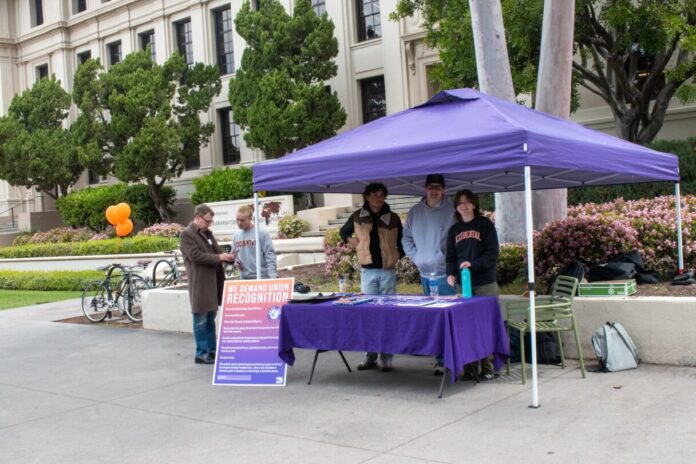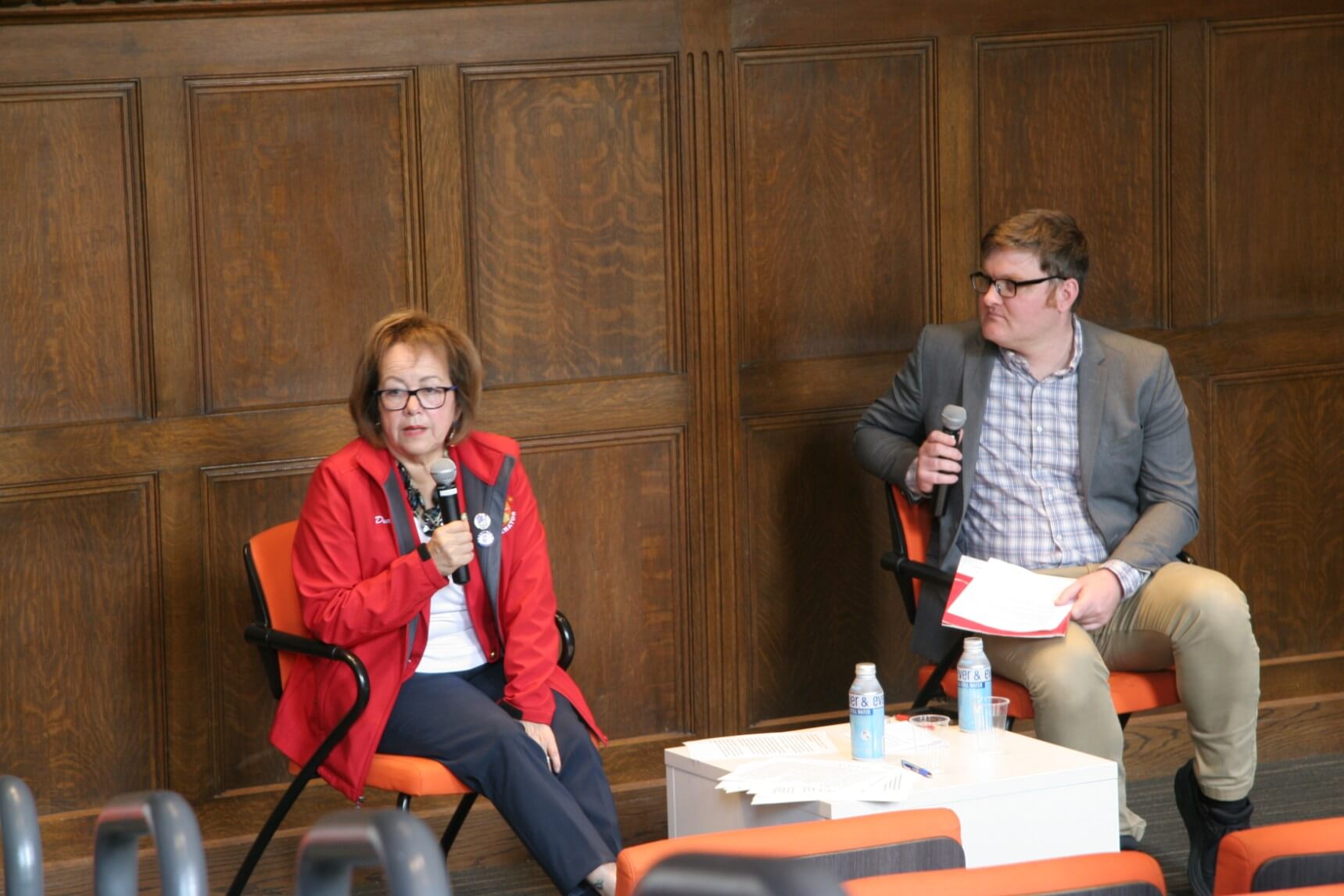
In advance of an impending election for the Rising Occidental Student Employees (ROSE) to form a union at the college, The Occidental asked questions to a ROSE representative, Noah Weitzner (junior), and the college administration via the director of communications Rachel Warecki regarding the next steps of forming the union.
According to the Information for Student Workers page of the college’s website, joining a union will not guarantee higher wages for students.
“The College may proceed with changes that were already planned, such as an increase in the maximum work-study offer from $3850 (Academic Year 2023-2024) to $4,300 (Academic Year 2024-2025). After several years of a relatively flat work-study offer, the College began a schedule of increases in 2023 that will continue to affect students through Spring 2025,” the website says. “Beyond that, the process of unionizing generally prevents the College from responding to students’ requests related to their terms and conditions of employment, or from making unilateral changes to students’ compensation, even if those changes would be beneficial to students.”

1) Would all Oxy students be part of the same union even though we work in different sectors of industries? For example, working conditions or hourly commitments might be different for people working the desk at the gym versus those working at ITS.
“The Union has filed two petitions to represent two separate units of student workers. One unit would be comprised of students within organizations that are currently more student-run, such as ASOC and KOXY. The other unit would include all other student workers, regardless of any differences in the nature of the work. If the Union is successful in both petitions, all student workers would be part of one unit or the other,” Warecki said via email.
2) If I am a union member, do I have to pay union dues? And if so, how much are they?
Weitzner said that everyone in the bargaining unit will have to pay dues but that the union will not start collecting dues until the first contract is won.
“It’s going to be a very small fraction of pay, probably around 1 percent,” Weitzner said. “We, the union, get to decide our dues, decide how much administrative support we want and how big of a strike fund we want. We also expect the first contract to greatly outweigh any dues.”
3) The college stated in its FAQ that college students will not be able to be supervisors if the workforce is unionized. Why is that?
“The National Labor Relations Act generally excludes supervisors from collective bargaining units. And permitting students to supervise other students may create the possibility of union grievances among students,” Warecki said via email. “The College views this as a potentially detrimental outcome for students, and would seek to avoid it.”
Weitzner said that the process of figuring out who is considered a supervisor and who is considered a manager will happen farther along in the process of negotiating a contract.
4) If I don’t want to join the union, do I have to?
Weitzner said that California is not a right-to-work state which means that it does not prohibit union security agreements.
“Right-to-work laws trace their origins back to white supremacist, segregationist, anti-labor tactics in the 1930s. Luckily, we don’t live in a [right-to-work] state, but if we did, it would ban union security agreements which allow Union contracts to compel workers to pay dues whether or not they join the union,” Weitzner said. “ROSE membership will be completely voluntary, while all student workers will reap the rewards of the Collective Bargaining Agreement and the support of coworkers in solidarity. ROSE has not yet written a contract proposal — we’ll need to hear all workers’ voices first — so we have not decided whether or not to include a union security agreement.”
Weitzner said that ROSE hopes that as many students as possible will vote in the upcoming union election.
“We do have a supermajority of the student workers who signed cards saying that they want a union, so we expect that it will be a landslide,” Weitzner said.
According to Weitzner, even if you signed a union authorization card already, you still need to vote in the election.
The Information for Student Workers webpage on the college’s website states: “If the union is certified as the exclusive representative for student employees at Occidental, all student employees will be represented by the union and will be subject to the terms and conditions of employment set forth in the collective bargaining agreement (if a CBA were negotiated).”
5) Will research fellowships be considered union jobs? Will this affect the summer programs?
“The union is seeking to represent nearly all student workers, including research assistants and grant-funded positions,” Warecki said via email. “We do not know whether or how this may affect summer fellowships or other research-related jobs.”
6) Who would negotiate a contract once a union is won?
According to Weitzner, ROSE will send a team of student workers to bargain along with a lawyer who is affiliated with SEIU-721 and also represents the non-tenured track faculty and clerical staff.
Weitzner said that the college’s side of the bargaining table will consist of the president, vice president and chief operating officer Amos Himmelstein or a representative from his office, and lawyer Jon McNutt. According to Warecki, the College will choose its bargaining team, including representatives from Human Resources and Student Affairs, who are involved in supervising student workers.
7) How will the union decide on demands democratically? How will representation for union members work?
“Since September, student workers have been talking to other student workers one-on-one and in bigger groups to figure out what people want to change about their jobs. We put this all together in a spreadsheet and prioritized the most mentioned demands,” Weitzner said. “But, going forward, once we’ve won our unit, we’re going to run surveys to every unionized student.”
According to Weitzner, members of the team of student workers at the bargaining table will be nominated and voted for by union members.
8) What will the various roles of the union be?
“The bargaining unit is yet to be formed. We already have an organizing committee, which means anyone who wants to help out. There have been between three and 70 people on it at times. The organizing committee will shift, all these roles are fluid,” Weitzner said.
Once the first contract is passed and shop stewards (work site union representatives) become necessary, Weitzner said they will be elected as well.
9) What’s the expected timeline for instituting the union after it is recognized?
“As soon as we do win the election, the school will be compelled by federal law to recognize this as a legal bargaining unit, and we’ll work from there,” Weitzner said.
The Information for Student Workers webpage of the college’s website states: “The College will be responding with its position as to the proposed voting unit, the individuals who will be eligible to vote, and the timing and method of the election.”
Weitzner said that ROSE filed a petition with the National Labor Relations Board for the secret-ballot election to take place April 16 while the college has requested April 30. Weitzner said that ROSE hopes the election will take place somewhere in between those dates. Weitzner said that ROSE hopes to win its first contract as quickly as possible.
The Information for Student Workers webpage says that if a vote to unionize is passed, it will be unlikely that a collective bargaining agreement will be in place for Fall 2024.
“It can take a year or more to negotiate a first collective bargaining agreement,” the website says.
Contact Ava LaLonde at lalonde@oxy.edu
*This article was updated at 12:20 p.m. April 10 to include Warecki’s statement on the College selecting its bargaining team and at 8:45 p.m. April 10 to include information on California not being a right-to-work state.
![]()






























